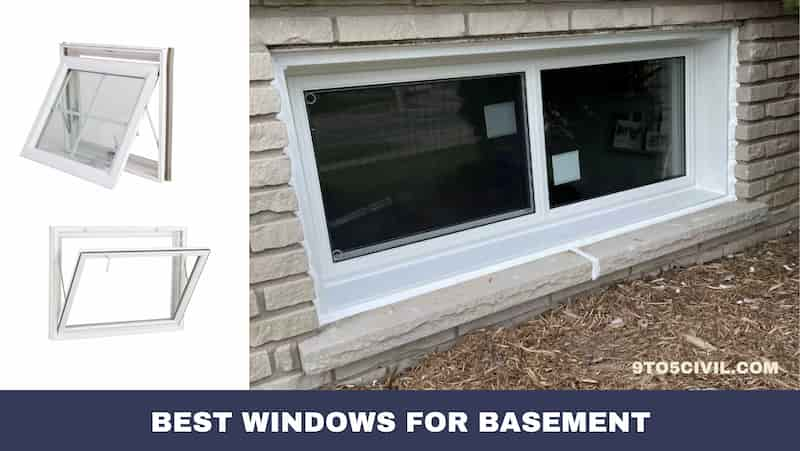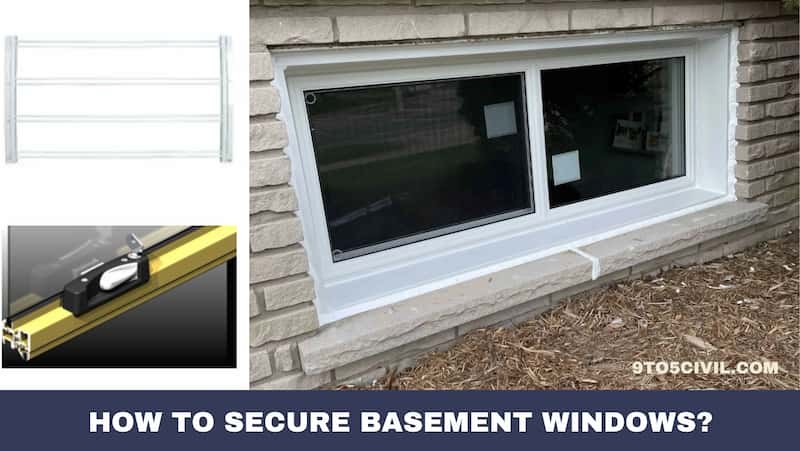
You should consider factors such as natural light, safety, ventilation, and aesthetics to choose the best windows for the basement. Egress requirements, window types, materials, and features all play an important role in making your basement a functional and inviting space.
Basements are often overlooked. It can serve various purposes from entertainment room to home office. A crucial aspect of making a basement livable and inviting is choosing the right windows. Windows not only provide natural light but also contribute to ventilation and overall aesthetics. Let us study the ideas and options for choosing the best windows for basements.
Best Windows for Basement
Best Basement Window Replacement Some popular Best Replacement Windows are casement windows, hopper windows, sliding windows, and awning windows.
1. Basement Hopper Windows
Choosing hopper windows for basements is a great option. These windows, although compact, offer superior efficiency by allowing fresh air to circulate in the basement area. Hopper windows are designed with a horizontal orientation and are hinged at the bottom, enabling them to open from above like an inverted awning window. Basement hopper window sizes range from 12 to 24 inches in height and 30 to 36 inches in length.
2. Basement Awning Windows
Choosing awning windows is a great option for basements. These windows provide an excellent solution for improved ventilation and natural light in underground spaces. Awning windows are hinged at the top and open outward from the bottom, creating a shield against rain while allowing air to circulate. This design not only prevents water from entering your basement but also ensures efficient airflow. Standard awning window sizes are from 2′” to 5’5-7/8” in width and 1’8” to 3’6” in length.
Awning windows in your basement allow you to enjoy well-lit and well-ventilated spaces. Their functionality and practicality make awning windows a top choice for maximizing the comfort and utility of your basement space.
3. Casement Basement Windows
A casement basement window is a type of window. Which is specially designed for basements and underground spaces. These windows are hinged on one side and open outwards like a door instead of sliding vertically or horizontally like traditional windows.
A casement basement window typically consists of a single pane of glass within a frame, which is hinged on one side. The window is operated using a crank handle that allows the window to be opened or closed. The swinging motion allows for maximum ventilation and easy cleaning of the inside, making them a practical choice for areas where access may be limited.
Basements are often deprived of natural light due to their below-ground position. Casement basement windows allow more sunlight to enter by providing a larger glass area than traditional basement windows.
Since casement windows open outwards, they require sufficient clearance outside the window to avoid obstructions such as bushes or trees.
4. Sliding basement windows
Sliding basement windows, also known as slider windows or gliding windows. It consists of two or more panes of glass that slide past each other when opened. This design allows for easy operation. That makes them an ideal choice for spaces like basements with limited accessibility.
Sliding basement windows provide a practical and aesthetically pleasing solution to improving the functionality and appearance of basement spaces. Their unique design, ease of operation, and ability to increase ventilation and natural light make them popular for basement areas.
Factors for Selection for Best Windows for Basement
Choosing the basement window types and design for your basement, such as awning-style windows that provide easy ventilation and accessibility.
These types of windows can reduce heating and cooling costs by reducing energy efficiency and insulation.
Choosing a reliable and skilled window installer capable of meeting the unique demands of a basement window setup.
Ensuring safety and security by fitting lockable windows and meeting building code egress requirements.
Best Basement Window Materials
Windows play an important role in a building’s aesthetics, energy efficiency, and overall comfort. When choosing window materials, durability is a key consideration. Durable window materials can withstand various environmental factors, contribute to energy efficiency, and reduce maintenance costs over time.
1. Vinyl Windows:
Vinyl windows have exceptional durability and low maintenance requirements. Vinyl window material is resistant to moisture, corrosion, and insects. These windows do not require painting or sealing and are well-suited to different climates. Vinyl windows are also known for their energy efficiency.
2. Fiberglass Windows:
Fiberglass windows are known for their impressive strength-to-weight ratio. Made from glass fibers embedded in resin, fiberglass windows are extremely durable, resistant to warping, and can withstand extreme temperature changes. These windows provide excellent thermal performance and do not require extensive maintenance. Their stability makes them the best choice for regions with harsh weather conditions.
3. Aluminum Windows:
Aluminum windows are commonly used. Aluminum material is resistant to rust and corrosion, which makes it suitable for coastal areas or places with high humidity. However, aluminum windows have lower insulation properties compared to other materials.
4. Composite Windows
Composite windows are resistant to warping, cracking, rot, and insect damage. Composite windows maintain their structural integrity and appearance over time, making them last longer. Composite materials, often a combination of wood fibers and thermoplastics, are inherently moisture-resistant. This makes them a great choice for high humidity or humid conditions, such as bathrooms, kitchens, and basements.
Composite windows often have advanced insulation properties. It helps reduce heat transfer and increase energy efficiency. This can lead to lower energy bills and a more comfortable indoor environment. Composite windows also have sound insulation properties. Which is especially beneficial for homes located in noisy areas or near busy streets. Composite windows can be used in a variety of applications, from residential to commercial. They are suitable for different climates and architectural styles.
How to Secure Basement Windows?
Securing basement windows is important to prevent unauthorized access, and break-ins, and ensure the safety of your home. Here are some steps to protect your basement windows.
1. Window Bars or Grilles:
Installing window bars or grills is another effective way to protect basement windows. These metal bars or grills can be secured by installing them above the window to prevent anyone from entering.
2. Tempered Glass:
Tempered glass is more resistant to impact and shattering than regular glass. If your basement windows are prone to breakage, upgrading to tempered glass can increase security. Not only is it strong, but if it breaks, it shatters into small, relatively harmless pieces, reducing the risk of injury.
3. Automatic Locks:
Windows with automatic locks are a great way to protect your windows. These locks engage automatically when the window is closed, a feature especially useful for those who may forget to lock their windows regularly.
4. Window Opening Control Devices (WOCDs):
WOCDs provide a way to let fresh air into your basement while maintaining security. Typically less than 4 inches, prevents unauthorized access.
Conclusion:
This article provides comprehensive insights into selecting the best windows for basements, considering factors like natural light, safety, ventilation, aesthetics, and functionality. The choice of basement windows is crucial to transform these often overlooked spaces into inviting and livable areas. Different types of windows are discussed, including hopper windows, awning windows, casement windows, and sliding windows, each offering unique benefits.
Suggested Read
- 9 Cheap Alternative to Garage Door
- 12 Best Alternative to Ceiling Fans
- 10 Best Alternatives to Sliding Glass Doors for Your Home
- How to Get a Free House?
- How to Move a Mobile Home for Free? | Complete Guide
- Where To Find Free Kitchen Design Advice?
- Best Gutter Installation Companies 2023
- What Are The Best Gutters For Heavy Rain?
Frequently Asked Questions (FAQ)
Why Are Basement Windows Important?
Whether you are using the basement for laundry and storage, as an entertainment space, or for a combination of functions, proper ventilation is necessary to prevent a buildup of harmful fumes. Basement windows provide that function. Higher-quality windows open easily and close securely as needed.
What Factors Should I Consider When Choosing Basement Windows?
There are many factors to consider when choosing the right basement window styles for your home, such as the size and shape of your home, whether or not you have an attic, or if you have any architectural features that would be affected by your choice.
What Are Some Popular Basement Window Options?
Awning, casement, gliding, and picture windows are our go-to picks for basement windows. Their openings, shapes, and other features make them a good fit in a lower level.
How Do Awning Windows Benefit Basement Spaces?
Their excellent ventilation properties and ability to remain open in all weathers also make awning windows a popular choice for basements; read our guide to decide if they’re the right choice for your basement. You may also choose an awning window for a room on the ground floor for security reasons.
Which Materials Are Best for Basement Windows?
The best type of window frame material for the basement is
- Vinyl Windows:
- Fiberglass Windows:
- Aluminum Windows:
- Composite windows
How Can I Secure My Basement Windows?
4 Tips for Securing Your Basement Windows
- Window Bars or Grilles:
- Tempered Glass:
- Automatic locks:
- Window Opening Control Devices (WOCDs):
 Skip to content
Skip to content 